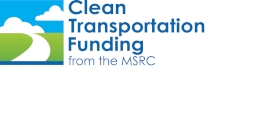The MSRC Has Targeted Millions in New Funding to Improve Southern California's Air Quality and Health
The Mobile Source Air Pollution Reduction Review Committee (MSRC) has targeted an unprecedented $38.5 million for innovative projects and programs in the South Coast region to help reduce harmful emissions from vehicles. The new two-year Work Program will fund five broad program areas, focusing on new or upgraded alternative fuel vehicles, alternative fuel infrastructure, and transportation control measures.
"This is the largest amount of funding and the most diverse Work Program we have ever had," said Greg Pettis, Chair of the MSRC. "We did extensive outreach last summer to those who are working on clean transportation issues to ask them how we could help get their clean air projects off the ground. As a result of their input, we developed these Work Program categories to reflect what is most needed in our communities to clean up the air from mobile sources. Additionally, for this funding cycle we created a two-year Work Program in order to offer more funding and provide more opportunities for people to apply."
FIVE PROGRAM AREAS OF FUNDING:
At $11 million, the Local Government Match Program has the largest targeted funding amount of any of the program areas. Incentives are available for local agencies that use their AB 2766 funds, which come from a vehicle registration surcharge directed to cities and counties to fund transportation-related projects that reduce air pollution. The Local Government Match Program will fund alternative fuel infrastructure projects, electric vehicle charging stations, and medium and heavy-duty alternative fuel vehicles. This year, bicycle infrastructure, such as creating bike lanes, is included as a new project category. The Local Government Match Program is popular with local jurisdictions because it provides a "dollar for dollar" match, enabling these agencies to stretch their limited resources even further to tackle clean air projects they most likely would not be able to do without the MSRC's funding.
The Alternative Fuel Infrastructure Program has $7.5 million reserved for new and expanded refueling facilities for compressed natural gas (CNG), liquefied natural gas (LNG) and L/CNG fuels. To generate even more clean air benefits, additional funding is offered for facilities that utilize CNG produced from renewable sources and for stations that are publicly accessible.
The Transportation Control Measures Program is targeting $7.5 million for projects aimed at curbing single-occupancy vehicle use in order to cut down on traffic congestion and reduce emissions. Eligible projects include traffic signal synchronization and "first mile-last mile" projects with a bicycle focus, designed to get commuters to and from their final destination when they take public transit. This funding is in addition to the $4 million already allocated for the Major Event Center Transportation Program, which partners large event centers not sufficiently served by public transit with transportation providers to get patrons to take alternative modes of transportation to events like Dodger and Angels baseball games, the Orange County Fair, and Auto Club Speedway races.
The Off-Road Vehicle Program has $7 million reserved for three project categories. Funding is available for advanced low-emission off-road construction equipment technologies including hybrid-electric, hybrid-hydraulic, and zero-emission equipment. Incentives also are available for airlines and cargo handling facilities at major southland airports to acquire zero-emission ground support equipment and install charging infrastructure to support this equipment. The third category provides incentives to marine terminal operators and distribution facility operators to purchase zero-emission cargo handling equipment.
The final program area is the On-Road Vehicle Program offering $5.5 million for new school bus purchases and the acquisition of zero-emission and near zero-emission medium heavy-duty trucks in the 14,001 to 26,000 gross vehicle weight rating category.
Program solicitations currently are being developed and will be released in the early fall. For more information about the Work Program or to be notified when the solicitations become available, please visit www.CleanTransportationFunding.org
The MSRC allocates Clean Transportation Funding from a $4 surcharge on vehicle license fees, specifically to be used for local projects designed to reduce air pollution from mobile sources such as cars, trucks and buses. Thirty cents of every surcharge dollar goes into the MSRC fund. More than $250 million has been distributed for air pollution-reduction programs since the MSRC was established in 1990. Clean Transportation Funding is heavily leveraged with investments from government agencies, as well as private sources, with billions of additional dollars contributed to projects throughout the region.
Membership of the MSRC is made up of representatives from the transportation agencies of Los Angeles, Orange, Riverside, and San Bernardino Counties as well as the Southern California Association of Governments, a designated regional rideshare agency, the California Air Resources Board and the South Coast Air Quality Management District.
